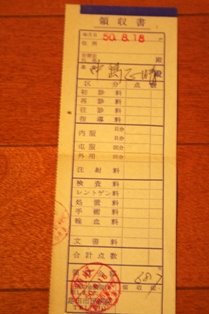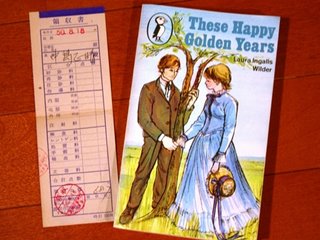Little House of Laura Ingalls
Sunday, September 03, 2006 by Mariskova

 Hasegawa-sensei, my 75 y.o. Japanese teacher, has this habit. Everyweek he would lend me a novel (English) and when I returned that novel, he would give me another. This habit of his has been going on for about one and a half year. The same amount of year I have been in his class. He lent me Sydney Sheldon's, Agatha Christie's, some others, and the last one is the Laura Ingalls' books. All the 7 of them plus 3 others! And guess what?! My Sensei bought the books in 1950 and he still kept the receipt! It costed him 687 Yen at that time!
Hasegawa-sensei, my 75 y.o. Japanese teacher, has this habit. Everyweek he would lend me a novel (English) and when I returned that novel, he would give me another. This habit of his has been going on for about one and a half year. The same amount of year I have been in his class. He lent me Sydney Sheldon's, Agatha Christie's, some others, and the last one is the Laura Ingalls' books. All the 7 of them plus 3 others! And guess what?! My Sensei bought the books in 1950 and he still kept the receipt! It costed him 687 Yen at that time!I have never read the books, but I watched the movie. I guess everyone back home at that time watched it since there was nothing better to watch in TVRI. Honestly, I found watching the movie before reading the books helpful because there are some descriptions that I wouldn't understand unless I have watched it.
Now, about the books. There are 7 of them telling a story about Laura's family (parents and sisters) and 3 others about her own family (husband and daughter). The books also depict the values that most Americans held at that time. Since the books were written based on Laura's real life, we can see a real glimpse of the early American history, the early life of the American farmers. For me, reading the books made me think about the life of a farmer who depends on earth and weather so much...
And then, there are others. Check these:
1. I learn that at that time Children should be Seen NOT Heard. Hmm... to tell you the truth it gives me ideas...
2. Some Americans at that time believed that 'A good Indian is a Dead Indian'.
3. Even Laura's educated mother was terribly afraid of Indians.
4. In one of the book telling the journey Laura took to the Indian country, her neighbor complained about the government rule that forced the white people to go out of the Indian
 country. She said that it was better for the white to take that vast land since 'God knows the Indians don't do anything with it'.
country. She said that it was better for the white to take that vast land since 'God knows the Indians don't do anything with it'.5. On the countrary, they are really proud of their Declaration of Independence that says '...that all men are created equal...'.
6. At that time, the way to punish children is to whip them. I heard it is now considered a crime.
7. Married women couldn't work outside the house.
8. Children went to school if they were not needed in the farm.
There are many others to tell but it is better to read them by yourself. I myself was very surprised (and foolish) when I read the 7th. book. I finally understood which man Laura married while it was actually written on all the seven covers: she used her husband's name on her novel.
Now, read what Laura's father in law said to his son (Almanzo Wilder, Laura's husband) when Almanzo was 9 years old:
This country goes three thousand miles west, now. It goes 'way out beyond Kansas, and beyond the Great American Desert, over mountains bigger than these mountains, and down to the Pacific Ocean. It's the biggest country in the world, and it was farmers who took all that country and made it America, son. Don't you ever forget that. -Farmer Boy, p. 124-








wow, hebat ya pak gurumu? koleksi buku plus receiptnya yg udah puluhan taun must be something ya? ck ck ck.. mbak, kalo pulang ke indonesia kabar2i ya..
Duluuu..kalo udah denger intro lagu film ini, kerasa banget deh hari minggunya. Kerasa harus sekolah besoknya..hahaha... Trus gw pengen banget tinggal di rumahnya keluarga Ingalls..hihi..
'lam kenal juga, mariskova-chan. hajimemashite, doozo yoroshiku. (eh, kalo bkn murid, boleh minjem buku beliau gak, barang 1-2 malem?)
mbok ya klo wong Indonesia pake bahasa Indonesia aja.. aku gak ngerti sampean ngomong apa??
duh, waktu SD niy, kalo minjem buku ini di perpustakaan, suka laper. pengen banget nyoba kue kentang yang dinikin ma. :)
dulu pengen belajar bahasa Inggris gara2x digodain papa waktu nonton serial ini (yeh,di TVRI tiap minggu siang, textnya kan suka lama nongol)
Kiky: " pa, lauranya ngomong apa? (sambil gigit2x ekrtas)
Papaku " Ngga boleh gigit2x kertas" hihihihi
ceritanya emang nggak mbosenin, biar udah bolak balik dibaca juga... apalagi pas cerita tentang panen ....
doh tulisannya beurat.. :(
maksudnya harus translate dulu ke indo terus ke sunda baru ngerti deh :(.. hehehe..
owh pilem laura yg itu yah..
tontonnan jaman SD.. pagi2 unyil dulu khan, terus aga siangnya album minggu baru terakhir pilem ini deh..
pelem wajib tiap hari minggu hehehehe